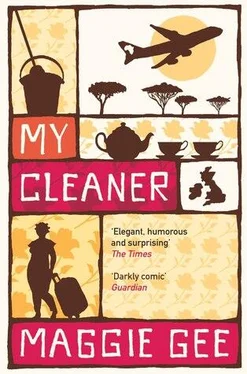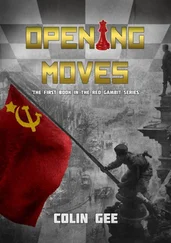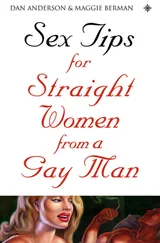This time she hears heavy feet approaching, and the door opens the length of a hand.
It’s not easy to see if it’s the same woman. “Zakira?” says Mary.
“What do you want?” The woman’s voice is very English, like the newsreaders on BBC World Service, which Mary listens to at home with Charles. As educated as Miss Henman is, or even more so, Mary thinks.
And yet, she’s thinner-faced than Mary remembers, in the half-dark of the half-open doorway. “Good morning,” Mary says, and smiles, but the woman looks at her fixedly, coolly. Mary begins to doubt herself. “You are not Zakira?” she asks, slowly.
“I hope I am,” the woman says, softly. “Could you kindly tell me who you are, now, because I can’t stand here chatting all day. I’m very pregnant, in case you haven’t noticed.”
Mary’s heart sinks with a sickening lurch. Zakira is pregnant. Has forgotten Justin. Has found another man. Mary’s mission is doomed to failure. How terrible, that Zakira is pregnant. Last time, of course, she had been clutching a plant, which must have hidden her big tummy.
“I come from Justin,” Mary continues, doubtful. “Justin has sent this flower for you,” which is not quite true, but she holds out the rose, heavy with earth in its sheath of thick paper. The woman’s eyes open wide with shock. There is a pause and then she says, mutedly, “From Justin. You had better come in,” and so Mary follows her down the stairs and in through Zakira’s white-painted front door.
Mary sees with approval that the flat is very tidy. Big expensive vases, containing no flowers. Some beautiful lamps, ornate metal and glass, which have a look of North Africa. There are many books, but they are all on bookshelves. A table with a laptop, covered in paper. Of course, Zakira is doing an MBA, the famous degrees that makes everyone rich. Mary wishes her kabito could have such luck…Justin loved this woman, and she gave him up. She looks a little older than Justin, Mary thinks. Zakira is probably too proud, too lucky. She will have her baby, and grow powerful and wealthy — but Mary cautions herself against envy.
She sits on the sofa while Zakira makes tea. She will not allow Mary to help her, but returns with two cups, and this time she smiles. But as she sees Mary without her coat, a glaze of anxiety chills her expression and her eyes become sharper, assessing her.
“How do you know Justin?” she asks, abruptly.
“I care for him,” says Mary, smiling, and Zakira’s mouth contracts with dislike.
“So did I,” she says, and half audibly, “What a waste of time that turned out to be.”
Mary is puzzled and starts again. “I am in England working for Justin’s mother.”
“His mother!” says Zakira. “His mother is a bitch.”
Mary cannot help laughing, and puts down her tea, in order not to spill it on Zakira’s sofa. Then she covers her mouth, and becomes very grave. Obviously Zakira is not interested in Justin. No wonder, since she is pregnant by another man.
“I am sorry,” Mary says, and stands up again. “I think I have come here by mistake. When do you expect your baby?”
“Christmas,” says Zakira. Mary’s struck with sadness: how lucky to have a Christmas baby. How different it would be if the baby were Justin’s. There is a long pause. Zakira, watching her, sees something sympathetic in Mary’s expression, because she suddenly says, “Have you got children?”
“Two,” says Mary, without thinking. And then realises she is thinking of Justin. “One,” she corrects herself. “His name is Jamil. He had to go and live with his father. I do not know what has happened to him.”
“Jamil? That is an Arabic name.” Zakira looks at her with more interest. “I was born here. But my parents are Moroccan.”
“His father is from Libya. A Muslim. I miss my son nearly every day. But a boy, you know. He must see his father.” Mary says the words she has said so often, but she does not believe them any more. Sometimes she wishes that Omar were dead.
“Did Justin’s mother send you to tell me to stay away?” asks Zakira. “She puts the phone down on me, you know.”
“I do not really come here from Miss Henman,” Mary hurries to say. “I come from Justin.”
Zakira stares for a long moment, deciding. And then she says, “Well, it’s Justin’s baby.”
And Mary claps her hands, and jumps in the air. “It is Justin’s baby! I am so happy! I am Mary Tendo. I was Justin’s nanny.”
A small tear starts from Zakira’s eye. No one has been happy about this baby. “My God, you’re Mary. I’ve heard so much about you. Is it really you? When did you come back?”
An hour later, they are walking together, even more slowly than Mary usually walks, towards the house where Justin must be sleeping.
Zakira has tied back her jet-black hair, and put lipstick on, and wrapped herself in an expensive purple coat which Mary envies. Zakira feels beautiful again, although she is enormous, leaning, sometimes, on Mary’s arm, a painted boat on the cold river, listing as she sails towards the ice of winter. “I love this country. If I’d been born in Morocco I couldn’t have done a thing that I wanted. But I hate the weather. I love the heat.”
Mary, in her thin orange coat, agrees strongly.
The two woman have struck up a makeshift alliance, based partly on Zakira’s acute need. She has spoken to no one for several days, and now she tells Mary everything. Her perfect life has imploded, this year: she has had to drop out of the topflight MBA she was doing at Imperial College, — because she was too sick to get in to classes three times a week, and fell behind with her assignments. “Although I have finally got permission to take it up again next year.” She tries to study now, but being pregnant makes her sleepy. “I’ve just been afraid that I will never manage, once the baby is born. On my own. In disgrace! You know, I’m not religious, but we are still Muslims.” Her parents are Zakira’s greatest worry. They are separated in all but name: her mother has gone back to Morocco to look after her own bedridden mother, and her father, a professor at SOAS, is currently a Visiting Professor at Harvard. “In one way it is a fantastic relief. If they were here, and knew, they would be going mad. In theory my father is a liberal, but in practice he would be so ashamed. And my mother — my mother is medieval. And at the same time, I do miss them. They have a house in Kensington. In a way they’ve always been too proud of me, and so I was bound to disappoint them, wasn’t I? A bit like Justin with his mother…I was a junior partner in the firm where Justin worked, the youngest ever, male or female, then I got on this high-powered MBA. My brother is the tearaway. But my mother loves him more than me!”
Zakira knows a lot about Mary already. “You were like a mother to him, he said. I can’t believe that you’ve come back.” She’s arrived like the bringer of hope, of life. Zakira’s face has lost its hard, bored expression. Her beautiful eyes are alight again. She understands Justin has really been ill, that it wasn’t as she feared, that he didn’t want to see her, after the bad quarrel when she gave him up. She understands now that he lost his job, that the two things together have made him ill. “And there were some real bitches in that office, believe me. I was glad to get out and do my MBA.” Now she knows that Justin has been ill, she can feel tender: now she knows what is wrong, she will care for him.
And yet there is the obstacle of Justin’s mother.
Zakira has never met Justin’s mother, although she has heard too much about her, for Justin loves his mother excessively, even for Zakira, who honours her family. This woman has snubbed her several times on the phone, slamming it down when Zakira was speaking. No wonder Justin hates her as well as loves her.
Читать дальше












